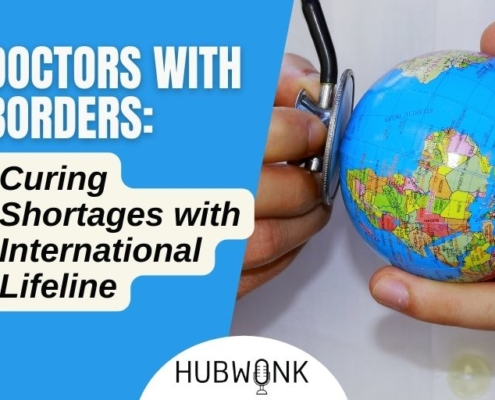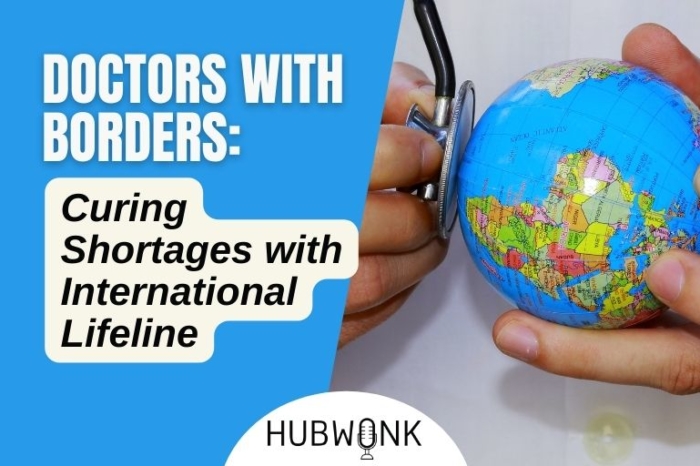Doctors With Borders: Curing Shortages With International Lifeline
/in Featured, Healthcare, Podcast Hubwonk /by Editorial StaffThis week on Hubwonk, host Joe Selvaggi talks with Cicero Institute’s Jonathan Wolfson about the growing doctor shortage and the potential to alleviate the crisis by tapping the global supply of well-trained physicians eager to find safety and freedom in the US.
Guest:
 Jonathan Wolfson is the Chief Legal Officer and Policy Director at the Cicero Institute. Before joining Cicero, he led the Policy Office at the U.S. Department of Labor where he managed DOL’s deregulatory efforts and oversaw DOL’s internal policy development think tank. He previously was a litigator and regulatory attorney at an international law firm representing clients before state and federal courts across the country. Following law school he served as a law clerk to The Honorable Edith Brown Clement of the U.S. Court of Appeals for the Fifth Circuit. Before law school, Jonathan was a policy analyst at the White House Council of Economic Advisers.
Jonathan Wolfson is the Chief Legal Officer and Policy Director at the Cicero Institute. Before joining Cicero, he led the Policy Office at the U.S. Department of Labor where he managed DOL’s deregulatory efforts and oversaw DOL’s internal policy development think tank. He previously was a litigator and regulatory attorney at an international law firm representing clients before state and federal courts across the country. Following law school he served as a law clerk to The Honorable Edith Brown Clement of the U.S. Court of Appeals for the Fifth Circuit. Before law school, Jonathan was a policy analyst at the White House Council of Economic Advisers.
WATCH:
Get new episodes of Hubwonk in your inbox!
Read a Transcript of This Episode
Please excuse typos.
Joe Selvaggi:
This is Hubwonk, I’m Joe Selvaggi.
Joe Selvaggi:
Welcome to Hubwonk, a podcast of Pioneer Institute, a think tank in Boston. There’s a conspicuous gap between the growing domestic doctor shortage and the abundance supply of foreign trained doctors eager to immigrate to America. Unfortunately, unlike highly trained professionals in other strategic fields, us state regulators require foreign trained doctors to redo their medical residency, regardless of past experience or expertise. Recently, this honors requirement was made more conspicuous when president Biden decided to make immigration a strategic weapon against the Russian dictatorship by promising a smooth immigration process to interested Russian scientists and engineers. Indeed. Whereas the us might expect to lure many of Russia’s finest professional minds, Russian doctors, by contrast facing a residency do-over are far less likely to immigrate and mitigate the us shortage. Is there a way to change our state level licensing process that would bring needed doctors to the us and could improvements offer doctors living in oppressive regime, such as Russia, a new pathway to freedom? My guest today is Jonathan Wolfson, chief legal officer and policy director at the Cicero Institute, Mr. Wolfson has researched and written extensively on the causes and possible solutions for the doctor shortage in the United States. He will share with us the scale and impact of the doctor shortage crisis and propose constructive policy steps that could help bring much needed medical professionals to the us system while also lifting the lamp of freedom to those doctors living in hostile regimes. When I return, I’ll be joined by Cicero Institute’s Jonathan Wolfson.
Joe Selvaggi:
Okay. We’re back. This is Hubwonk. I’m Joe Selvaggi, and I’m pleased to be joined by the chief legal officer and policy director at the Cicero Institute. Jonathan Wolfson, welcome to Hubwonk, Jonathan.
Jonathan Wolfson:
Thanks, Joe. Thanks so much for having me. I’m really glad to be here.
Joe Selvaggi:
Well, great. I don’t know if all our listeners know the Cicero Institute. So before we dive into our topic today in a high level, what is the Cicero Institute all about?
Jonathan Wolfson:
Yeah, so the Cicero Institute was started a couple years ago and its focuses on bringing entrepreneurial ideas to public policy problems. A bunch of folks in Silicon valley sat down and said, what if you were to get some of the smartest people in a room and think about a problem, what would their solutions be? Not trying to think about it, whether there’s a politician who likes it because that’s good for their party platform, but what would the right answer to those questions be? And so we try to come up with those answers and then we have as an organization, both a research 501c3 [inaudible] organization that tries to identify the solutions to those problems. And then we have a 501c4 advocacy arm that works with lobbyists in various states around the country. And the objective is for us to help get legislators who will champion these ideas and actually enact them into law.
Joe Selvaggi:
Wow. Using entrepreneurs to inform policy. What an idea, not leaving it to the politicians. Well I’m on board. Let’s, let’s start with today’s topic. We’re gonna talk about, you know, the primary reasons why we have doctor shortages possible remedies for helping us resolve those. But we also have a twist in our show. I don’t wanna jump bury the lead but we can also talk about using our policy reform as a strategic weapons in our against our international enemies. So I’ll, I’ll tease our audience with that. So let’s start with the problem. We’ve had in an earlier hub won episode we address the fact that we have an aging population. We have a doctor shortage that grows every day, put some numbers for our listeners benefit. How, how dire is the doctor shortage in the United States right now?
Jonathan Wolfson:
Yeah, Joe. So in the United States, it’s projected that by the year 2030, we’re gonna be short by about 120,000 doctors in the United States. And that’s actually exacerbated by the fact that projections say over the next decade or so, we’re gonna see between 30 and 40% of the physician population hit retirement age. That doesn’t mean they’re actually gonna retire, but it’s gonna mean that they’re gonna hit that age where a lot of workers in our workforce traditionally have decided to try to figure out ways to cut back on their hours. Maybe find ways to not be as busy and spend more time with family, with friends doing activities they love. And so you add on top of the fact that we think we’re gonna have 120,000, too few doctors with the fact that roughly a third of our physician population is gonna be looking for ways to cut back on their work. And we’re gonna see a massive physician shortage over the next 10 to 15 years. And this physician shortage is not just gonna hit rural areas or poverty stricken areas. But as you get more and more of a shortage, it’s gonna start hitting everywhere in the country because people are gonna need to find doctors and they’re gonna have longer and longer waits to do it because there’s just not enough doctors to take care of the patients that need to get taken care of.
Joe Selvaggi:
So we’re already have shortage levels, 120,000 you mentioned. And that would be if no, no doctors ever retired. If, if they do retire or scale back as others do. And we talk about on the show, the silver tsunami, the 10,000 people every day retire. So the aging baby boomer is affecting every industry, but medicine should be no different. So as these doctors age out it makes already bad problem. Worse is, is the shortage across the board across all specialties, are we talking primarily here about primary care family doctor type doctors?
Jonathan Wolfson:
So there’s gonna be shortages, the expectations, projections, the American medical association, and other organizations. You’ve looked at this say it’s gonna be kind of across specialties, but it’s gonna be much more acute in primary care. The reality is that primary care tends be lower compensated. It is not considered as prestigious for people coming out of the top medical programs. And so people aren’t looking to get into primary care as kind of their number one thing to do coming out of med school. And as a result, you see people, if they have a choice between being, say a cardiac surgeon and being a pediatrician, a lot of them are gonna choose to be a cardiac surgeon for a number of reasons. But as a result, that means that the shortages are just gonna be exacerbated at the primary care level. And to your point about the aging baby boomers as those baby boomers age, while they’re going to need specialty care, they’re also gonna be able to need to see their regular primary care physician that much more frequently. And so not only are you going to see the population of doctors shrinking, you’re gonna see the demand for their services increasing at the same time.
Joe Selvaggi:
Sure, sure. And I don’t wanna pile on this this bad news, but I think virtually every day I hear about how this terrible past couple of years of COVID has accelerated burnout, you know this seems to be beyond the ordinary great resignation, as we’re told this includes medicine or might be even worse in medicine. Do you have any numbers on how you know, this shortage has been aggravated by, by COVID?
Jonathan Wolfson:
Yeah, well, so what’s interesting is we’ve heard those stories and the Massachusetts medical society actually before COVID did some analysis on physician burnout, and this was specific to Massachusetts and they found before COVID that roughly 78% of physicians were already facing burnout, which is a crazy high number. And then we think about how much COVID probably would’ve exacerbated that number. They haven’t come out with their most recent data based on post COVID analyses. But I feel like based on all the anecdotal reporting, we’ve all heard and seen over the last couple years that that number’s gonna be even higher, what they found in the study that they released. They said that that means there’s about a 30% chance that those doctors would reduce their workload over the next two years to try to reduce burnout. So again, this is one more place that we’re gonna see doctors for whatever reason, maybe it’s those doctors who previously were thinking about just cutting back their hours.
Jonathan Wolfson:
And now they’re just so burnt out that they say, I’m just gonna retire altogether, or you’re gonna see people who will set, who will look at the profession, maybe they’re in medical school and they get an opportunity to go work at a drug company and try to help cure a disease, or they can go and be a patient care physician. And they’re gonna say, you know, everyone I know in patient care is absolutely burnt out and they’re not getting to solve the biggest problems. They’re stuck doing paperwork and dealing with charts all day. I can go and actually solve a problem by going and working for one of the medical device companies. And I’m gonna go do that instead. And so that’s just another way you further shrink the population of doctors who are available to care for all of the needs that we’re gonna see in our country, in the gears to come
Joe Selvaggi:
Okay, we’ve established, we’ve got a problem. Let’s talk about why why is it so sh there’s such a shortage? Is, is it is it owed to the fact that students, young people don’t wanna go into the medical field and become doctors? Would they rather become stock brokers or attorneys?
Jonathan Wolfson:
Well, as, as a recovering attorney myself, I can tell you, it’s probably not the right choice to go become a lawyer instead of becoming a doctor. But even if that was part of the problem, the reality is we’re not seeing the number of people applying to med school, go down. We’re not seeing the number of people who are completing medical school go down. The reality is we have some artificial constraints on the market that have been imposed. We have a limited number of medical school seats, and these numbers have not really changed to any significant extent over the last 30 years, as we’ve seen the population of the United States grow, as we’ve seen global populations grow, we’re producing about the exact same number of medical school graduates in a typical year. There’s a few, that’s not exactly the right number. It’s gone up a little bit, but it hasn’t gone up anywhere near the numbers you need.
Jonathan Wolfson:
If you’re just trying to track population on top of that, the number of residency seats, which you know, for folks who don’t know, once you finish your medical school, you know, when you finish law school, you go take a bar exam and you can go start practicing on clients immediately, right? You show up in court and you can make all sorts of mistakes and hurt your poor client. But that’s the way that we learn to be lawyers with doctors. We realize that we need to be a little more careful with how we treat patients. And so we want them to go through additional kind of specialized training. And that’s called residency and residency slots are a highly competitive process where medical students spend roughly six months of their medical school career, traveling around the country, interviewing for residency slots at various schools in the specialties that they would like to work in.
Jonathan Wolfson:
Ultimately there’s, what’s called match day. And this is this really important day for a medical school student’s life, where they are officially told you have been matched to go from your medical school to re residency program X. You don’t get to choose between 10 different ones. It’s not like the college admissions process. It would be as if you go through the college admissions process and they tell you, as, as of tomorrow, you will be a student at Boston university. That’s where you’re gonna go. And that’s how they go about their residency. And so these slots have been artificially constrained in the Medicare budget since the 1990s, what’s crazy is in the 1990s, there were projections that we were gonna have a physician overage, an excess number of physicians in the United States. And so they artificially constrained the funding that was gonna go to the various states and the medical schools and hospitals for residency slots. And as a result, we’ve seen almost no growth in residency slots in the United States in over 20 years. And this is really where the problem kicks in. And so as a result, people graduating med school, even many people who do well in med school, in the United States, can’t find a residency slot. And so they either have to go find some alternative career or they have to apply over and over and over again in the hopes of getting that residency slot so that they can then go start seeing patients.
Joe Selvaggi:
So we’ve got lots of people crowding to get through very, very few doors. And I know you’re a recovering attorney or you’re also a re recovering economist. I think that’s you’re also trained as economist. When we artificially constrain supply, of course perhaps those doctors could command a greater premium up for their services. The Syme says that might be the reason. Why do you think we’ve constrained the slots that all doctors need to go through and therefore constrain the supply of doctors? What, what, what would be the motive to do that?
Jonathan Wolfson:
That’s a great question, Joe. You know, I think that there, I’m sure there are some places in the country that the sole reason that they constrain the number of doctors, whether it’s through the licensing requirement, in a state or through the reduction in residency slots or medical school slots is a competitive reason. And doctors are looking for a way to capitalize on, you know, a smaller market share. Obviously, if you can get monopoly pricing, you can make more money. Insurance companies probably play a big role in making sure that that’s not as big of an opportunity for doctors, even if you were to limit constrain the supply, the insurance companies are still going to negotiate rates. The Medicare rate negotiation is all still gonna happen. But I do think that what we’ve seen is professionalization in the United States. Every profession likes to think of itself as special.
Jonathan Wolfson:
We do it in the law. We do it in plumbing. We do it in barbering. Every single profession in the United States likes to think that they have the special sauce and they want to set up barriers to entry because they really want to protect the industry. They don’t want people hurting individuals who are patients. They don’t want customers hurt. They don’t want the citizenry hurt. And so it’s really easy to go into a state legislature and say, Hey, look at these people who are hurt by somebody who doesn’t have a license by somebody who doesn’t know what they’re doing. We need to increase the barriers to entry in this, into this profession. And so once you increase those barriers, then anything you do to make it harder to access the materials you need to, to reach those barriers becomes that much harder to get to. And so I think that that’s really a big part of the problem. And so we see that doctors and the medical, the state medical boards rightly want to make sure patients are safe and they wanna make sure that only good medical students become doctors in their state. But what ends up happening is those burdens get stacked on top of other burdens. And now the medical schools are stuck having to train a much smaller number of doctors to fill a much smaller number of residency slots.
Joe Selvaggi:
So the, the, the wrapping on this policy is the quality control, but I can imagine a very talented potential doctor just looking at this Byzantine process and saying, you know what, I, I don’t, I don’t think I wanna go into that profession. There’s too many doors to walk through that aren’t there, as you mentioned in other professions. So I, I wanna talk about a something you’ve written about sort of a, a workaround whereby we don’t make as many locally grown doctors, but there are doctors across the world who presumably I hope our listeners will accept our premise that biology is the same the world over. So so let’s talk about that concept. You mentioned in one of your pieces that I read that as a place to start, there are Americans who go internationally for procedures that they don’t otherwise get here.
Joe Selvaggi:
So it doesn’t seem to be the case that Americans worried about quality control are reticent to go to another country to have a procedure. So it doesn’t seem to be a pervasive view that we’ve got the only good doctors in the world share with me. What’s going on? Why can’t we let’s say help import some doctors who presumably would like to come here? Why you know, I don’t, I don’t wanna jump too far ahead here, but why don’t we just incense have plenty of eager doctors immigrating to the United States.
Jonathan Wolfson:
Yeah, well, I’ll start kind of at the premise, you know, you mentioned the fact that Americans are traveling all over the world for care, and this isn’t just people looking for experimental care or for treatments that they can’t get their insurance company to approve in the United States. So they’re looking for a cheaper place to get it. In fact, we see world class athletes all the time, a colleague of mine, Josh Arsen boat. And I wrote an oped during the Olympics talking about the number of Olympic athletes who travel all over the world to get surgical treatments. But the crazy thing is if they go to the best knee surgeons in Finland, or in Iceland who have treated hundreds and thousands of Olympic athletes, David Beckham, one of the most world famous soccer players in, in the world, he’s been treated by these guys. If you, as an American athlete, travel over to Finland for treatment, nobody bats nine.
Jonathan Wolfson:
They say, you know, that’s going to the best doctor, but if the us ski team wanted to hire that doctor to come and be the us ski team’s doctor in salt lake city, the Utah medical board would say he wasn’t allowed to practice in Utah. And so this is just a barrier to entry where we’re saying to doctors, they can’t practice even though to your point, biology’s the same all over the world. And so one of the interesting things is that in the United States, in order to become licensed, you have to complete your residency program in the United States or in Canada. So even if you have taken medical school in the United States, if you end up not matching and don’t get one of those residency slots in the United States, and let’s say you get residency in England or in Japan after you’ve complete that residency, if you want to come back and practice in the United States, say, you go to a Harvard medical school, you don’t match for a residency.
Jonathan Wolfson:
You go to Japan and you do a residency program there, and you wanna come back to Boston and practice in Boston. You would have to actually repeat residency, you’d have to match to a residency program in the United States in order to practice. And this doesn’t matter if you have been, just come out of residency. So if you’re that student who went to Harvard and went to Japan for residency and finish residency and want to come tomorrow to practice, or if you stay in Japan and practice for 25 years and become the best orthopedic surgeon in Japan and the while you want to come and on the, you know, the faculty at Harvard, the state of Massachusetts is not gonna allow that doctor to practice in Massachusetts, unless she or he decides to repeat residency in the United States or Canada. And so that’s, that is just one of the rules that we have set up.
Jonathan Wolfson:
And so, regardless of where you’ve practiced and learned to practice, you end up having to repeat residency. One other thing I’ll mention Joe, which is kind of not everybody understands about a third of our doctors in the United States are actually foreign trained, meaning that they went to medical school outside of the United States. And then they matched into a residency program in the United States or Canada, and now are practicing here. So it’s not a question of whether folks can get medical training in other countries and then bring that training here and be successful. In fact, there’s some studies that show that they actually have better outcomes than the American trained doctors do. So it’s really a question of whether or not there’s something special about doing residency in the United States that makes that type of training unique. That that’s the only way you can learn to practice on patients in the United States.
Joe Selvaggi:
Now I don’t, I don’t wanna be labeled Mr. America first though. I perhaps might, might view it that way, but why is it that we’re letting foreign trained or international medical students attend or go through these residencies when clearly many American medical students aren’t getting those slots themselves.
Jonathan Wolfson:
That’s a great question. So the reality is that we have had international medical students come and used residency slots and then practiced in the United States for decades. This isn’t a, a new phenomenon. This isn’t something that happened, you know, when some president that somebody may or may not like was in office, this is the, this has kind of been a real reality of our system. We in the United States realize that there are some really talented people all over the world, and we would love to get those talented people to come to the United States. And if they can help kill our citizens, it’s a great idea to do it. And that’s kind of been a tradition in the United States from right or left political leanings from, you know, all sorts of economic positions. The reality is we’ve always allowed this. It hasn’t really increased by that significant of a number.
Jonathan Wolfson:
And what ends up happening is these international students come in, they interview for residency slots, and many of them have amazingly impressive credentials. And if you are running a residency program at Boston university, you look at those students and you say, look, these students actually have exactly the credentials that we need so that we can produce the absolute best anesthesiologist that we can possibly produce out of our program. And so the programs are attracted to finding the best possible students in the same way that we’re not surprised that there are NBA players who are playing from all over the world and the NBA teams are scouting ’em. These residency programs are scouting top students from top medical schools all over the world, and they want them to come and do residency programs. So it’s kind of a longstanding tradition, but the reality is there is we need to figure out what we can do for folks who can’t find residency slots, who complete medical school in the United States. And there really has not been a solution proposed for them either
Joe Selvaggi:
Again, to your original point, if you wherever you get them, it’s this just same number of residencies. You’re not gonna solve the problem. You’re just getting a sort of diverse, more diverse supply of doctors from around the world. But again, to drill further down into this, this concept the people who are showing up might be fresh graduates from medical school who are going to enter residency, the best surgeon in the world, or the, the one that attends to this Olympic ski team he’s or she has been practicing for many, many, many years has established him or herself as the best in the world. They themselves seem very unlikely to immigrate to the United States, largely because they’d have to start all over again, right. They’d have to sort of put the awards and the accolades on, on a shelf and, and, and reenter the residencies. Do I have that right? Is it, is it bad as I describe
Jonathan Wolfson:
That’s exactly right. So even if you, and I would feel absolutely no qualms about sending our very best friend, our spouse, our kids to go get treatment from one of these doctors, and this could be true. You know, you could have a president of a foreign country who has absolutely no problem getting on a plane and flying and getting treatment. That doctor has to jump to the exact same hoops as somebody who finished residency in one of those foreign countries today. And so that’s kind of a crazy concept that somebody could be well established as the best fill in the blank specialty around the world. And that doctor can’t practice in the United States, unless she decides to come back and pretend to be a brand new medical school, graduate working with those, you know, folks in their late twenties who just finished medical school and learning, learning how to be a doctor.
Joe Selvaggi:
Yeah. That that’s hard, hard to, hard to believe. So I wanna talk about how you addressed two, two issues at the top of the show. One was a, a shortage of doctors in general, but also a shortage of doctors in let’s say poor or underserved communities for whatever reason they’re underserved. How does the medical community make sure that you know, the best and bright is coming outta school? It all just head to Boston where lots of people and perhaps lots of money who’s helping the rural Appalachian communities make sure they have enough doctors there. How does that work?
Jonathan Wolfson:
So amazingly, there’s not really a, a huge structure of systems that are set up to ensure that doctors go where they’re most needed. We have what’s called health professional shortage areas. And so there are some grants and loans and money that’s given from the federal government. If you are a practicing doctor in those areas, there’s some financial incentives, but generally doctors are free agents and they are able to go where they choose. So if they would prefer to be in Boston where there’s say money, or, you know, a nightlife that they prefer that there’s nothing preventing them from doing that so long as, you know, one of the major hospitals or doctor’s offices in that area wants to hire them. And so this is part of the reason that international physicians are so intriguing is that international physicians tend to actually concentrate more heavily in these rural and underserved areas as compared to American trained co medical student graduates.
Jonathan Wolfson:
And so, you know, in, in Massachusetts, for example, there are two entire counties that are considered health, professional shortage areas. And then some part of every county in the state of Massachusetts is actually a medical shortage, a medical professional shortage area. And so what we see is that there are lots of places where doctors could go and serve underserved populations, but at least as of right now, even though the Northeast is graduating a lot more medical students than say the Southwest, and there are a lot more residency slots in the Northeast than there are in the Southwestern United States, the doctors are still not going to those areas in the numbers that we need to reach these to address these shortages.
Joe Selvaggi:
So you’re saying the, the foreign born or foreign trained are more likely to go to these let’s say less well served communities. I’m gonna take a guess and say, okay, our, you know, I’m here in downtown Boston. Every other person is, is a doctor, but but they probably are chosen Boston, cuz they may have grown up here. They may have grown up in Lincoln and every, everybody they know is a doctor and they’re not apt to go to Springfield or someplace like this. Is, is, does it follow that way? Whereas the, the, the, the American medical student from Lincoln stays in Boston, the foreign born and trained doctor may go to, you know I don’t know what community you say is the least well served here in Massachusetts, but would go there.
Jonathan Wolfson:
No, I think that’s exactly right, Joe. I think, you know, in the same way that as me being a kid who grew up in the Chicago suburbs, I might not want to go hang out with a bunch of white Sox fans since I’m a Cub fan. So I have these tribal reasons that, you know, and you might have a Boston Boston kid who doesn’t necessarily want to go hang out in Connecticut with all the Yankees fans, you know, the wrong part of Connecticut. That’s right. You know, the, what you, what you could very well see is somebody who doesn’t have those same biases or not. And bias is not a bad word in this sense. This is just kind of your personal upbringing and your reasons for wanting or not wanting to live in one particular place. If you don’t have those. And you see America as a country of opportunity, not just as kind of, these are the neighborhoods that I would prefer to live in, but just the entire country is somewhere. I would like to be. If you’re a doctor trained overseas, that becomes an opportunity for you to go to an area that maybe there aren’t as many doctors you are able to then treat more patients, you can integrate in the community more quickly and more easily. And, you know, if you have some differences to your community, finding a community that is going to embrace you as kind of their doctor can be really rewarding for a doctor who comes to the United States, it gives them a chance to really embrace the American dream.
Joe Selvaggi:
So very interesting. So we’ve established that foreign trained doctors may well be among the best and brightest of all those going into residency. And we also established that they’re more inclined to work in places that really need doctors. So it’s, it’s a, a terrific asset. So I wanna pivot our conversation from you know, beating the drum about Dr. Shortages and talk about something about immigration. In fact you recently wrote a piece in the Washington examiner, which I thought was a very interesting read where you talk about recent president Biden’s laud, audible goal of, of providing incentives for the most skilled Russians engineers and scientists. Really a strategic weapon is saying, okay, look we don’t just want to turn off your oil. We want to take your best and brightest, smartest people and have em relocate here. You can see it as perhaps they’re escaping a dictatorship or just looking for a better life. We’ll take all the smart people you wanna give us. But your, your piece points out the fact that that doesn’t apply to Russian doctors, or I guess Russian, aspiring residency students say more about this glaring shining light on this problem vis Avi strategic immigration policy.
Jonathan Wolfson:
Yeah, the, the Biden administration was absolutely right to point out that there are a number of people who wanna leave Russia right now. And we, as the United States should be welcoming them with open arms. If you’ve got someone in the stem field. So science, technology, engineering, and math, you’ve got someone in one of those fields who can come and work in our hospitals as a researcher can come and work in our universities can come and work in our technol technology companies. All of these are great opportunities to find amazing talent, especially given the workforce shortages that the United States is facing right now, finding talented people is a great idea. But to your point in the United States, even if you were a Russian doctor, who’ve been practicing for 15 years as a primary care physician, or let’s say you’re an OB GYN, and you’ve delivered hundreds of babies over the last couple years, and you want to get out of Russia.
Jonathan Wolfson:
If you decide that you wanna move to Massachusetts, because you’ve got family there, or you wanna move to Illinois or wherever you wanna move, that person is not gonna be able to practice medicine because of the rules that we’ve already been talking about. So my piece just points out the irony that even though we wanna encourage this brain drain, right, there’s strategic reasons to do it for, you know, geopolitical reasons, but there’s also just physician shortage, strategic reasons that finding well trained physicians from around the world can benefit our country. The reality is these state rules block those individuals’ ability to practice medicine. So, you know, Russia’s talking about over 400,000 people per year leaving their country, and they think they’re gonna lose probably about a hundred thousand tech workers in just the next month. These are all smart people that president Biden wisely wants to bring into the United States. And so finding ways to say, Hey, if you’re a medical doctor in Russia you know, they’ve got about 600,000 doctors in Russia. And so if, you know, even a handful of those doctors came, if we only if 120,000 short, and we got a fifth of their doctors to come here, we very quickly start addressing our physician shortage.
Joe Selvaggi:
So good. You, you, you didn’t say in your article, but I’ll ask you now, can you sort of infer from the data that says, okay, this is the percentage of engineers or nuclear scientists or percentage of whatever that leave Russia to come here. Can you infer from, you mentioned 600,000 at what rate would they be likely to immigrate if there were no additional barriers, not no barriers, but no additional barriers that are specific or peculiar to the medical community.
Jonathan Wolfson:
Yeah, that’s a great question. You know, I think that what we do know is that polling of Russian young workers, so roughly 18 to 39 population, about half of those workers say they would like to leave Russia and work abroad. Now that doesn’t mean they all wanna work in the United States, but if you have a population of about 150 million people in Russia, and you take that big a block of their working population and half of them want to leave, and we know that there’s, you know, about 600,000 total doctors, the ability for us to find 30, 40, 50,000 of those doctors who would be interested in being to the United States is not hard to imagine now where in the United States they’d wanna move. I can’t tell you, but I think it wouldn’t be surprising if we were to reduce the barriers to entry as doctors, if those folks who have the skills and ability to pass the medical licensing exams that are still required to, you know, PA be a licensed in the state, but for the fact that they haven’t taken residency in the United States or Canada, I think that we’d see a significant number.
Joe Selvaggi:
So you mentioned earlier in a response that that much of the, these constraints are made at the state level. And you know, Massachusetts, our listeners come from all ends of the political continuum. They’re, they’re doers are not just thinkers. They like to affect change. I can imagine our listeners, let’s say perhaps those on the right who are more market oriented, see more doctors as, as, as only beneficial to a medical system, that’s already too expensive. We wanna remove constraints or increase supplies. So as to reduce costs that has that appeal. We all think we wanna reach out to those living in Russia in an oppressive dictatorship. So the natural American compassion on both sides and, and maybe on, on the left, you know, might perceive these people as refugees who, who deserve America’s you know hand of freedom. What can our listeners do to change this? What, what can we do to reach out and invite these doctors, these, you know, ones that we absolutely need? What can we do at a state level to increase the flow, not just from Russia, perhaps from other countries like it where we it’s it’s win-win to use a cliche.
Jonathan Wolfson:
Absolutely. So at Citra Institute, we have designed a reform to allow international physicians to enter the United States without repeating residency. And basically it would be a state statute that provides a few different pathways for a doctor who is already licensed in another country and has been practicing for a few years to apply directly to a state medical board, to get their training approved so that they could come in to have a medical facility, whether that’s a hospital or a doctor’s office, sponsor them and give them a temporary kind of contingent license that after a couple years automatically becomes a full license to have international residency programs themselves apply to states to get kind of the good housekeeping seal of approval from a state licensing board, that in the state of Massachusetts, for example, all the people who graduate from residency programs at, you know, Cambridge university in London can count as if they had graduated from a us based residency program.
Jonathan Wolfson:
And the last is to allow people who are already licensed and practicing in a handful of countries, generally Commonwealth countries that are allowed to pretty much instantly move to Canada and practice medicine. Would it be allowed to come to the United States? Because right now, if you are a practicing doctor in Canada and you wanna move to the United States, you don’t have to repeat residency. And so that’s the kind of the one backdoor path that currently would exist is if you’re a doctor in England, you can go practic in Canada for three or four years, and then you can move to the United States and start practicing here without repeating residency. But we’re thinking let’s grease those skids and let them come straight to the United States. So that’s a policy reform that we have on our website. I’d be more than happy to talk to anybody who’s interested in trying to advance this reform.
Jonathan Wolfson:
There are other organizations out there that are working on these reforms. Our lobbying arm has helped push this legislation in a handful of states. I know there are other organizations that are pushing it in Colorado. The state of Washington passed a temporary law. Similarly that allows a temporary license, but it doesn’t have a permanent status yet. The goal there would be that it would become permanent, but that’s not what their statute says. So there’s work going on. And I know the Massachusetts legislature is working on a study committee bill right now to try to allow a study committee to try to study this. So there’s opportunities, the Massachusetts and around the country to advance this legislation. And we’re happy to work with anybody who sees this as a great opportunity to address the physician shortage for all the reasons that you pointed out.
Joe Selvaggi:
Yes. I can’t imagine that, you know, I suppose somehow everybody can find a, a political valance of any issue, but I can’t imagine in anyone being against this particularly if, if we can help underserved communities with doctors, high, high quality doctors, I’m sure we’ll have standards. Are, are there international standards are, let’s say, are there, you know, we’re rattling off you know, developed countries? Are there places or standards that we don’t accept or wouldn’t accept, or would you have any concerns about quality from, I’m not gonna throw any country under the bus here, but you know, doctors that ought not to, to show up with a, with a stethoscope,
Jonathan Wolfson:
No, there are definitely, there are definitely countries, or sometimes it’s not even countries, sometimes it’s particular programs in particular countries that are problematic in the same way that we all have schools or programs at schools in the United States, that all of us kind of would look, look sideways and worry that someone coming out of that program might not have the right skills. What we try to do in our legislation, our proposed legislation is to give the state licensing board, all the authority to vet candidates, the same way they would with an American or Canadian trained resident. What we want them to be able to do is require all the same examinations. And so that’s a really great way to guarantee that, you know what you need to know. We want them to be able to evaluate the training that the person actually received, whether that means that the students need to send transcripts or syllabi, whatever those materials need to be. So that state licensing boards can evaluate and ensure that people really have the training that they claim to have. And one of the reasons that we say we want to focus on doctors who are already practicing medicine and are licensed in their countries, is because it’s not just someone who says, Hey, I’ve taken a couple classes, but this is someone who’s actually spent some time touching real patients in their country.
Joe Selvaggi:
Well, that that’s terrific. We don’t have too many, you know, truly improving policy prescriptions here, but this comes as close as I I’ve yet to see for our listener. I can’t imagine anyone not, not supporting this. So for our listeners who wanna get engaged for our legislators here in Massachusetts, who perhaps want to champion this cause where can we find you your work and Cicero Institute?
Jonathan Wolfson:
Yeah. Visit us on the Cicero Institute website it’s CICEROinstitute.org. Our lobbying arm is Cicero action @csoaction.org. I’m more than happy to talk to anybody, visit with legislators, however, that can be helped to advance this. I think it’s a cause that really can help our country can help the patients of our country and can make sure that people who have amazing skills that can be used to heal. People are allowed to use those skills to do so.
Joe Selvaggi:
Yes, indeed. And let’s not forget, we help the doctors too who are trying to help us. That’s wonderful. We’re gonna end the show there. We’ve covered the topic very well. Thank you very much for your work and your advocacy and for introducing our listeners to this very important topic. Thank you, Jonathan.
Jonathan Wolfson:
Thanks, Joe. Really appreciate being here. Thanks.
Joe Selvaggi:
This has been another episode of Hubwonk, a podcast of Pioneer Institute. If you enjoyed today’s episode, there are several ways to support Hubwonk and Pioneer Institute. It would be easier for you and better for us. If you subscribe to Hubwonk on your iTunes podcast, catcher, if you wanna make it easier for others to find Hubwonk, it would be great. If you offer a five star rating or a favorable review, we’re always grateful. If you wanna share hub on with friends, if you have comments or ideas or suggestions for me for future episode topics, you’re welcome to email me hubwonk@pioneerinstitute.org. Please join me next week for a new episode of Hubwonk.
Recent Episodes

Drug Cost Disruption: Direct Generic Access Can Save Consumers Billions

SCOTUS Gun Stun: Bearing Arms in Summer Bruen Decision
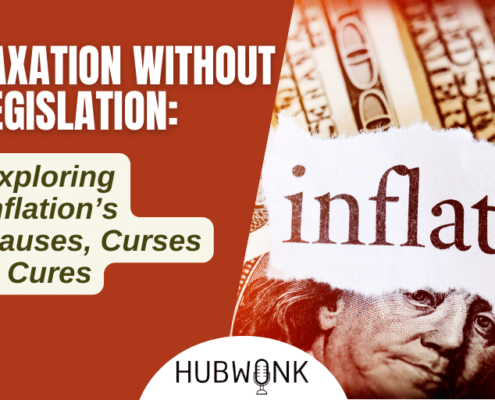
Taxation Without Legislation: Exploring Inflation’s Causes, Curses & Cures
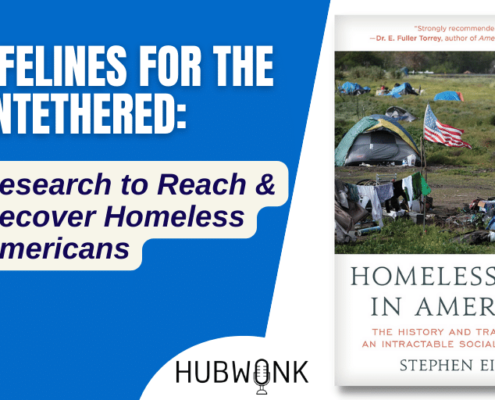
Lifelines for the Untethered: Research to Reach and Recover Homeless Americans
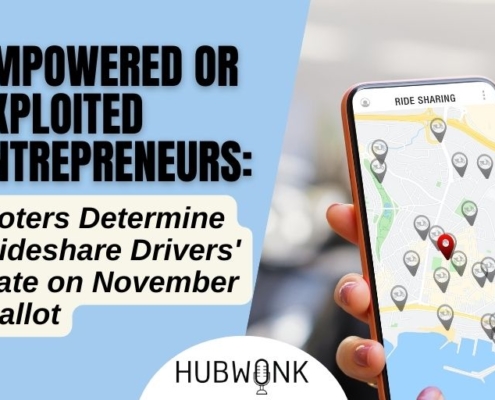
Empowered or Exploited Entrepreneurs: Voters Determine Rideshare Drivers’ Fate on November Ballot

Searching For Space: Massachusetts Real Estate in a Time of Covid
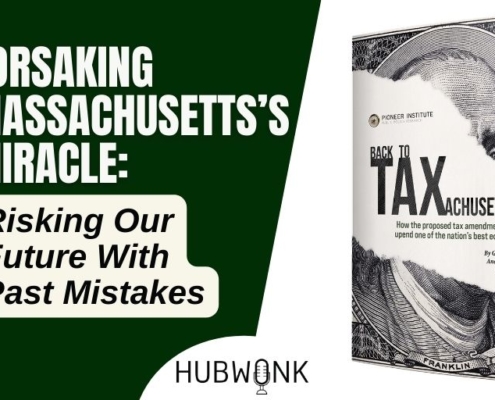
Forsaking Massachusetts’s Miracle: Risking Our Future With Past Mistakes
